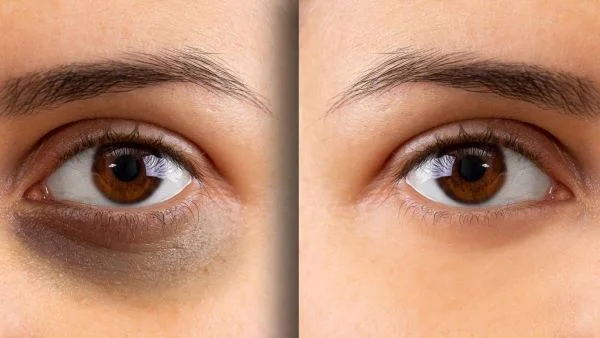Radiance Restored
Dark Circles
Explore advanced treatment options and effective solutions tailored for this condition.
Overview
Dark Circles
Dark circles are a common cosmetic concern characterized by darkened skin under the eyes. While they are not usually a sign of a serious health problem, they can make a person look tired, stressed, or older than their actual age. The most common causes of dark circles include lack of sleep, genetics, aging, excessive screen time, allergies, dehydration, sun exposure, and poor diet. As people age, the skin under the eyes becomes thinner, making blood vessels more visible, which can contribute to a darker appearance. Allergies and eye strain can cause inflammation and puffiness, further enhancing the appearance of dark circles.
Symptoms often include visible pigmentation beneath the eyes, puffiness, sagging skin, and a tired or dull look. Preventing and treating dark circles involves lifestyle changes such as getting enough sleep, managing stress, staying hydrated, and following a balanced diet. Topical creams containing ingredients like caffeine, hyaluronic acid, or Vitamin C may help reduce their appearance. Regular use of sunscreen and limiting screen exposure can also prevent further darkening. For persistent or severe cases, consulting a dermatologist is recommended.
Book a personalized consultation today to discover how we can help you achieve radiant, flawless skin.

Talk to Our Experts
Dark Circles
Dark circles are a common cosmetic concern characterized by darkened skin under the eyes. While they are not usually a sign of a serious health problem, they can make a person look tired, stressed, or older than their actual age. The most common causes of dark circles include lack of sleep, genetics, aging, excessive screen time, allergies, dehydration, sun exposure, and poor diet. As people age, the skin under the eyes becomes thinner, making blood vessels more visible, which can contribute to a darker appearance. Allergies and eye strain can cause inflammation and puffiness, further enhancing the appearance of dark circles.
Symptoms often include visible pigmentation beneath the eyes, puffiness, sagging skin, and a tired or dull look. Preventing and treating dark circles involves lifestyle changes such as getting enough sleep, managing stress, staying hydrated, and following a balanced diet. Topical creams containing ingredients like caffeine, hyaluronic acid, or Vitamin C may help reduce their appearance. Regular use of sunscreen and limiting screen exposure can also prevent further darkening. For persistent or severe cases, consulting a dermatologist is recommended.
What are Dark Circles Under Eyes?
Dark circles under the eyes are darkened or discolored areas of skin caused by factors like lack of sleep, stress, aging, genetics, or dehydration. They often make a person look tired or older and may be accompanied by puffiness or sagging. Proper care can help reduce their appearance.
What are Eye Bags Or Puffy Eyes?
Eye bags or puffy eyes refer to mild swelling or puffiness under the eyes. They are commonly caused by aging, fluid retention (especially after waking up or eating salty foods), lack of sleep, allergies, or genetics. While usually harmless, they can give a tired or aged appearance and may be reduced with proper sleep, hydration, cold compresses, and skincare.
Dark Circles Under Eye Causes or Reasons
Lack of Sleep: Insufficient rest leads to pale skin, making blood vessels more visible.
Genetics: Inherited traits can make some people more prone to dark circles.
Aging: Thinning skin and loss of fat under the eyes reveal underlying blood vessels.
Allergies: Allergic reactions can cause inflammation, rubbing, and puffiness, worsening dark circles.
Dehydration: When the body lacks water, the skin under the eyes appears dull and sunken.
Eye Strain: Staring at screens for long periods can enlarge blood vessels around the eyes, causing darkening.
Sun Exposure: Excess sun increases melanin production, darkening the skin under the eyes.
Poor Diet: Deficiencies in iron, vitamins (especially B12, K, and E), and antioxidants can affect skin health and tone.
Dark Circles Symptoms
Dark circles under the eyes appear as darkened, discolored patches often accompanied by puffiness or sagging. They can make the face look tired or aged. Common symptoms include bluish or brown pigmentation, thin skin, mild swelling, and a dull appearance, sometimes with dryness or irritation around the eyes.
Darkened Skin: Noticeable discoloration or pigmentation under the eyes, usually bluish, purple, brown, or black.
Under-Eye Puffiness: Mild swelling or bags beneath the eyes, often accompanying dark circles.
Tired Appearance: The face looks dull, fatigued, or older due to shadows and discoloration.
Thin or Sagging Skin: Skin under the eyes may appear thinner, making blood vessels more visible.
Dry or Irritated Skin: In some cases, the skin around the eyes may feel dry, itchy, or sensitive.
Types Of Dark Circles
Pigmented Dark Circles: Caused by excess melanin production, leading to brown or black discoloration. Common in people with darker skin tones.
Vascular Dark Circles: Result from visible blood vessels under thin skin, appearing bluish, purple, or pink. Often caused by poor circulation, lack of sleep, or fatigue.
Structural Dark Circles (Shadowed): Caused by facial bone structure or loss of fat under the eyes, creating shadows that look like dark circles.
Mixed-Type Dark Circles: A combination of pigmentation, vascular issues, and structural shadows, often seen in more severe or long-standing cases.
